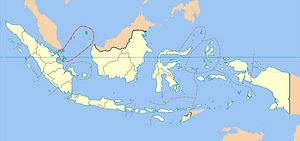China is hardly in need of additional territorial disputes these days, but it seems to have a new one on its hands.
Last week a senior Indonesian defense official announced that China’s new drawing of its nine-dash line includes waters that Jakarta claims as its own.
“China has claimed Natuna waters as their territorial waters. This arbitrary claim is related to the dispute over Spratly and Paracel Islands between China and the Philippines. This dispute will have a large impact on the security of Natuna waters,” assistant deputy to the chief security minister for defense strategic doctrine Commodore Fahru Zaini said, according to Indonesia’s official news agency, Antara.
The Natuna waters (named after the islands they border) are part of Riau Islands Province in Indonesia, located along the southern part of the strategic Strait of Malacca. They are part of the South China Sea. Fahru explained that a new map on Chinese passports encompasses part of the Natuna waters, raising the irk of Indonesian officials.
“What China has done is related to the territorial zone of the Unitary Republic of Indonesia. Therefore, we have come to Natuna to see the concrete strategy of the main component of our defense, namely the National Defense Forces (TNI),” Fahru, who was visiting the Riau Islands, added. He went on to complain that China’s nine-dash line isn’t transparent owing to the fact that it doesn’t include precise coordinates.
Interesting, as Scott Cheney-Peters notes over at the excellent Center for International Maritime Security (CIMSEC) blog, just weeks before Fahru made the announcement about China’s encroachment, Indonesia had announced it was building up its naval, air and army forces on and around the Natuna Islands as a preemptive measurement against instability in the South China Sea.
“The deployment of the TNI forces around the Natuna waters aims to anticipate possible infiltration as a result of instability in the South China Sea,” TNI chief General Moeldoko said according to an Antara report. While maintaining that Indonesia is ready to cooperate with countries like China and the U.S., Moeldoko added: “Since Natuna is strategically located, the increase of its forces at sea, on the ground, and in the air is necessary to anticipate any instability in the South China Sea and serve as an early warning system for Indonesia and the TNI.” Earlier in the year, Indonesian media reported that Jakarta would soon announce the Natuna Islands as one of the four hotspots it would focus on militarily in the coming years.
Scott, who recently wrote a piece for The Diplomat on Indonesia’s maritime woes, also noted that the waters around the Natuna Islands are where Indonesia will host the upcoming 2014 Komodo multilateral joint exercise. The exercise will include participants from the ASEAN countries, China, the United States, Russia, Australia, New Zealand, India, South Korea, and Japan.
Although the Komodo exercise’s main focus will be on Humanitarian Assistance/Disaster Response (HA/DR) operations, Indonesian officials have made no secret of the fact that they intend to incorporate the growing maritime disputes into the drills.
In announcing last summer that Indonesia would be hosting the 2014 exercise, a senior TNI Naval official said: “The exercise will focus on naval capabilities in disaster relief, but we will also pay attention to the aggressive stance of the Chinese government by entering the Natuna area.” The same official went on to state: “We want to explain that our foreign police stipulates that Natuna is part of Indonesia…. Currently there has been no claim from China over the Natuna area but we do not want the Sipadan-Ligitan incident to happen again.”
China’s decision to antagonize Indonesia could be a costly one given the amount of influence Jakarta wields in the Association of Southeast Asian Nations (ASEAN).

































